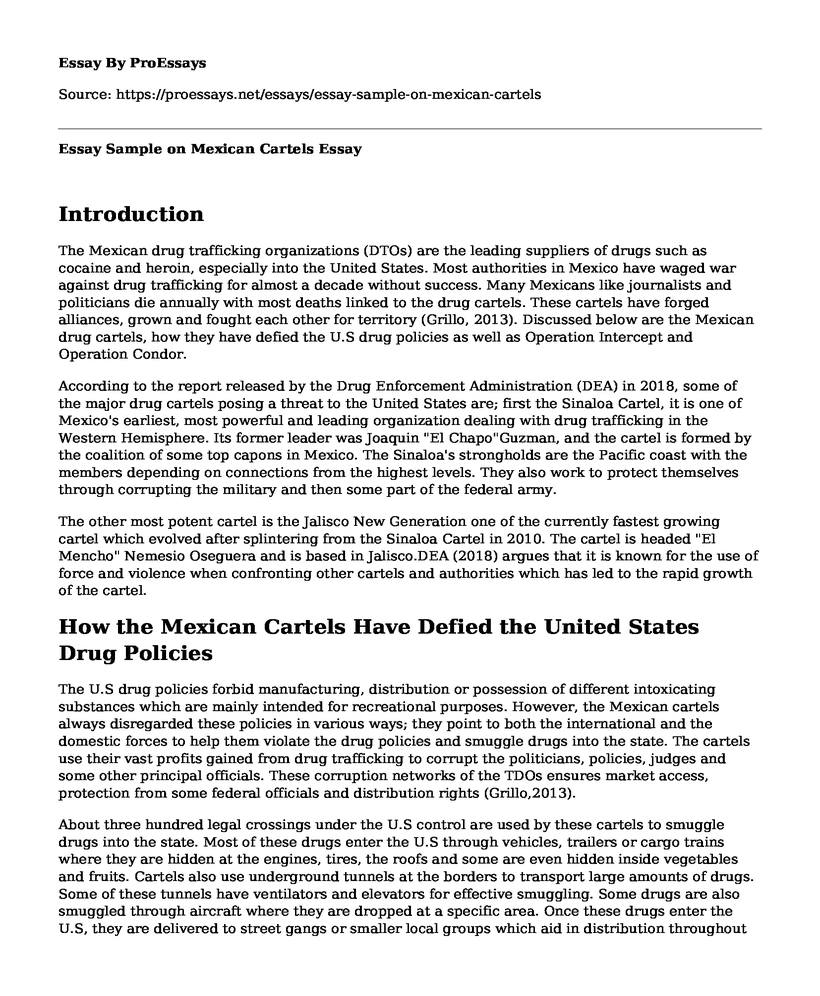Introduction
The Mexican drug trafficking organizations (DTOs) are the leading suppliers of drugs such as cocaine and heroin, especially into the United States. Most authorities in Mexico have waged war against drug trafficking for almost a decade without success. Many Mexicans like journalists and politicians die annually with most deaths linked to the drug cartels. These cartels have forged alliances, grown and fought each other for territory (Grillo, 2013). Discussed below are the Mexican drug cartels, how they have defied the U.S drug policies as well as Operation Intercept and Operation Condor.
According to the report released by the Drug Enforcement Administration (DEA) in 2018, some of the major drug cartels posing a threat to the United States are; first the Sinaloa Cartel, it is one of Mexico's earliest, most powerful and leading organization dealing with drug trafficking in the Western Hemisphere. Its former leader was Joaquin "El Chapo"Guzman, and the cartel is formed by the coalition of some top capons in Mexico. The Sinaloa's strongholds are the Pacific coast with the members depending on connections from the highest levels. They also work to protect themselves through corrupting the military and then some part of the federal army.
The other most potent cartel is the Jalisco New Generation one of the currently fastest growing cartel which evolved after splintering from the Sinaloa Cartel in 2010. The cartel is headed "El Mencho" Nemesio Oseguera and is based in Jalisco.DEA (2018) argues that it is known for the use of force and violence when confronting other cartels and authorities which has led to the rapid growth of the cartel.
How the Mexican Cartels Have Defied the United States Drug Policies
The U.S drug policies forbid manufacturing, distribution or possession of different intoxicating substances which are mainly intended for recreational purposes. However, the Mexican cartels always disregarded these policies in various ways; they point to both the international and the domestic forces to help them violate the drug policies and smuggle drugs into the state. The cartels use their vast profits gained from drug trafficking to corrupt the politicians, policies, judges and some other principal officials. These corruption networks of the TDOs ensures market access, protection from some federal officials and distribution rights (Grillo,2013).
About three hundred legal crossings under the U.S control are used by these cartels to smuggle drugs into the state. Most of these drugs enter the U.S through vehicles, trailers or cargo trains where they are hidden at the engines, tires, the roofs and some are even hidden inside vegetables and fruits. Cartels also use underground tunnels at the borders to transport large amounts of drugs. Some of these tunnels have ventilators and elevators for effective smuggling. Some drugs are also smuggled through aircraft where they are dropped at a specific area. Once these drugs enter the U.S, they are delivered to street gangs or smaller local groups which aid in distribution throughout the state (Grillo, 2013).
Operation Intercept
It was an anti-drug measure at the Mexican-United States border launched by President Nixon in 1969 after implementation by Myles Ambrose. The purpose of the Operation was to stop the flow of heroin, marijuana and other harmful drugs into the United States. It was a surprise to many because it not only aimed at forbidding narcotics but also publicizing the new crime war to force the Mexicans to comply with the anti-drug campaign of Washington. It involved scrutiny of the border from the sea and air and inspection of all vehicles crossing the border entering the U.S from Mexico. However, persistent complaints from drivers at the border led to the abandonment of the inspection and about a decade later; most Americans forgot the operation except for the few who resided at the border (Gooberman, 2016)
Operation Condor
Operation Condor was one of the most important military operations launched by the Mexican Federal Government against drug traffickers and plantations. Around ten thousand soldiers under General Jose Hernandez Toledo command who had fought various battles like the students' massacre which occurred in 1968 were dispatched in plantations to get rid of all the narcotic crops. Despite reducing drug production, destroying the drugs and increasing the drug prices, drugs continued flowing into America and in Mexican streets. It is believed that some of the cartels involved police and politicians hence making the drug problem escalate. The drug leaders later got tired of been chased by police and demanded the resignation of Chief Roberto Orduna Cruz within 48hours failure to which they would murder police officers, Cruz ended up resigning and left the county (McSherry, 2012).
References
Drug Enforcement Administration. (2018). National Threat Drug Assessment (DEA-DCT-DIR-032-18). Washington, DC: U.S. Department of Justice. Retrieved on 22nd February 2019 from https://www.dea.gov/sites/default/files/2018-11/DIR-032-18%202018%20NDTA%20final%20low%20resolution.pdf
Gooberman, L. A. (2016). Operation intercept: the multiple consequences of public policy. Elsevier.
Grillo, I. (2013). Mexican Cartels: A Century of Defying US Drug Policy. The Brown Journal of World Affairs, 20(1), 253-265.Retrieved on 22nd February 2019 from https://www.jstor.org/stable/24590897?seq=1#page_scan_tab_contents
McSherry, J. P. (2012). Predatory States: Operation Condor and covert war in Latin America. Rowman & Littlefield Publishers.
Cite this page
Essay Sample on Mexican Cartels. (2022, Nov 22). Retrieved from https://proessays.net/essays/essay-sample-on-mexican-cartels
If you are the original author of this essay and no longer wish to have it published on the ProEssays website, please click below to request its removal:
- Right to a Family and Private Life
- Memo to Intelligence Department of Homeland Security - Critical Thinking
- Paper Example on Legislative Policy: Individual with Disability Education Act
- International Crime Witness Essay
- Can Anyone Be Above the Law? Essay Example
- Essay Example on Data Security: Essential Ideas, Reactions, Regulations & Reclaiming
- Paper Example on Restorative Justice: An Overview of Programs and Benefits







